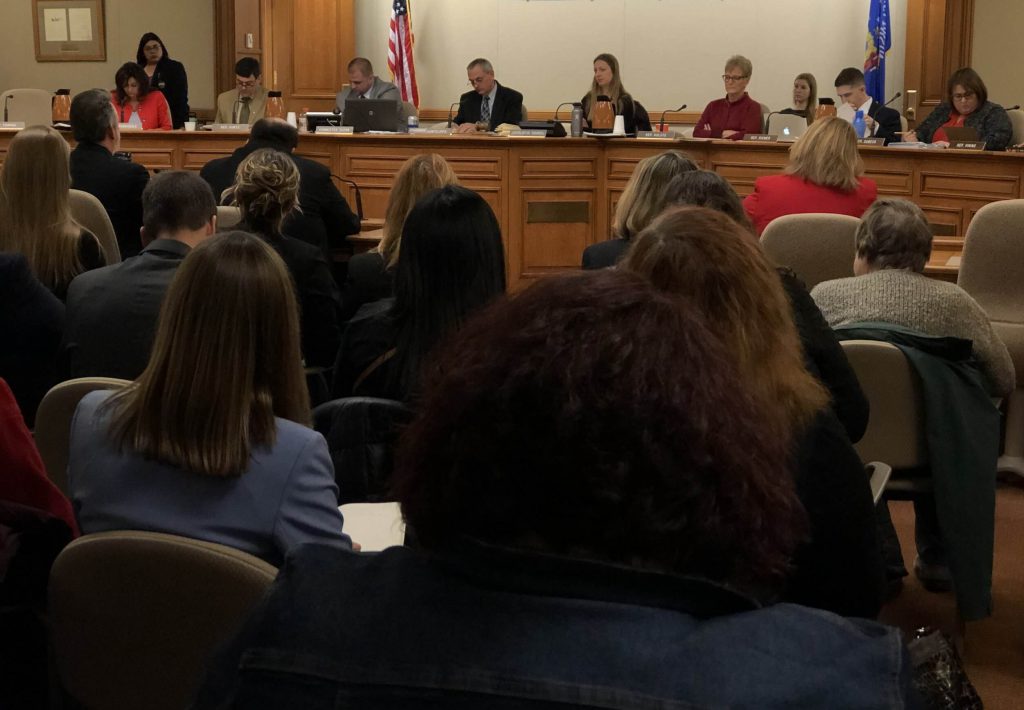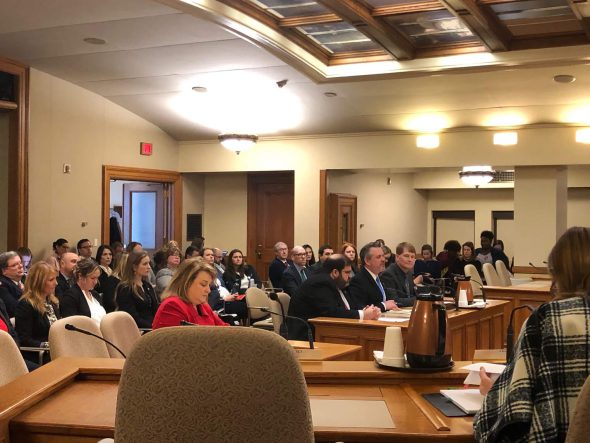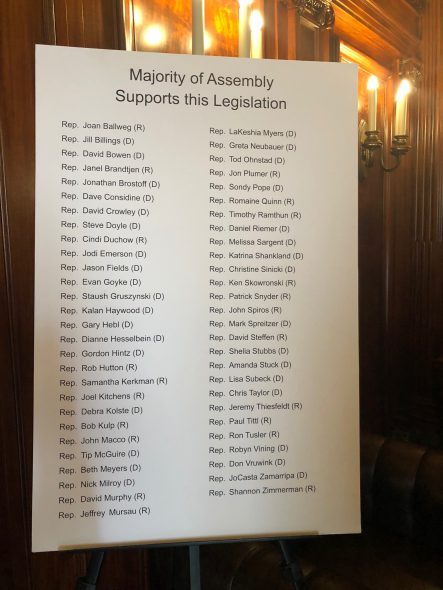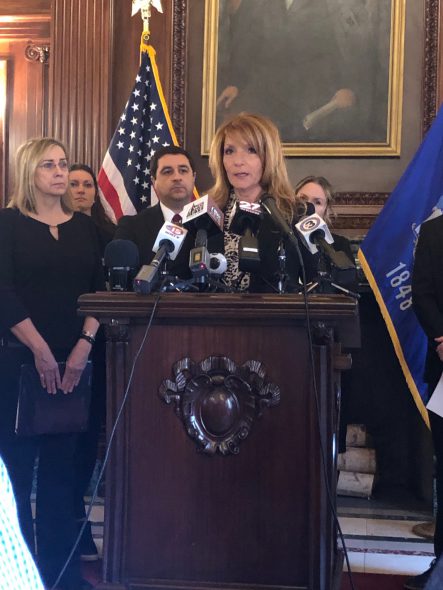Will Republicans Kill Rape Kit Bill?
30 states passed bills to assure rape kits are processed. Only Wisconsin has made it partisan, expert testifies.

The Assembly Health Committee holds a public hearing on sexual assault evidence kits. Photo by Melanie Conklin/Wisconsin Examiner.
The large committee meeting room in 412 East of the Capitol features a semi-circular raised dais. The 15 members of the Assembly Health Committee are seated on it, looking out over a packed room of people waiting to testify.
The issue on the Feb. 5 agenda that has attracted most of them — and a host of media, too — is a new bill on sexual assault evidence kits that was unveiled just last Thursday, less than a week ago.
This new bill AB 844 has few cosponsors — none of them Democrats — and no groups registered in favor of it. In fact, everyone here to speak about it today, other than the new bill’s four authors, is registered to speak against it. Citizens are milling and talking as they take their seats, many expressing shock that this public hearing is even happening today. They’re trying to understand how years of bipartisan work with experts on this sensitive and pressing issue, culminating last May in a bipartisan bill with 72 legislative sponsors from both parties, has been tossed aside. All that work has been replaced in less than a week by a controversial new bill.
Everyone in the room seems to agree on the goal: Standardizing procedures, roles and a timeline to ensure there is never again a backlog of thousands of sexual-assault evidence kits sitting on shelves while rapists remain free to re-offend.
Despite their political differences, both Schimel and Kaul — as well as Republican AG J.B. VanHollen before them — have worked with a group of experts on statewide Sexual Assault Response Teams to devise the popular, bipartisan bill AB 214. Late last year it seemed destined for the governor’s desk, having Republican authors, 72 cosponsors from both parties and breezing through the Senate in early October on a resounding voice vote.
Yet AB 214, which lays out new procedures, specific timelines and regulations to avoid any backlog, is not getting a hearing today. It’s been stuck in this health committee with Chair Joe Sanfelippo (R-New Berlin) refusing to bring it forward since last May — even after he promised in December to do so. Instead, he is holding a hearing on a different bill, AB 844. This new bill has altered timelines, added provisions that are not in sync with best practices and includes a victim’s bill of rights that victim advocates say is flawed. It also contains provisions tying it to the extremely divisive and seemingly unrelated partisan issues of private school vouchers and Immigration & Customs Enforcement (ICE) arrests.
Kaul gives voice to what many in the room are thinking.
“I implore the members of this committee to consider and pass AB 214,” he says, looking up at committee members during his testimony.. “Wisconsin has already had a backlog of untested sexual assault kits. We know it can happen. And when a backlog develops there can be real consequences — for survivors, for whom justice may be delayed, and for public safety, as dangerous offenders may go unprosecuted.”
The GOP bill’s backers
Before Kaul speaks, the four Republican representatives who authored the new bill — Sen. André Jacque (R-De Pere), Rep. David Steffen (R-Green Bay), Rep. Janel Brandtjen (R-Menomonee Falls) and Rep. Jeremy Thiesfeldt (R-Fond du Lac) — offer their opinions and take questions.
“I see the components of this bill, which I support individually as well as together, as being very beneficial for victims,” asserts Jacque. “I think it’s very key that they all work together seamlessly.”
The authors also give explanations for the most controversial pieces of the new GOP plan — allowing students who are sexually assaulted to transfer to private schools at taxpayer expense even if they otherwise wouldn’t qualify for the subsidy, and requiring ICE be brought in when a potential assailant might not be a citizen.
Steffen, the author of both evidence kit bills, admits the new one stirs controversy: “I would just ask that you sheath your dagger for the next couple minutes and just be open-minded and listen to what is being attempted here.”
“An undocumented immigrant woman is just about the least likely to report a sexual assault. This provision provides protection of sorts for those women,” Steffen continues. “So I would hope that you would receive those … with the spirit and intent with which they’re presented. And, and take it for the way it is written.”
The authors of the legislation repeatedly state that they have the best interests of the sexual assault victims at heart. They explain how they feel the new additions to the legislation could help them.

GOP sexual assault kit bill authors Janel Brandtjen, Andre Jacque, David Steffen, Jeremy Thiesfeldt testify on their new bill AB 844 at a public hearing on sexual assault evidence kits. Photo by Melanie Conklin/Wisconsin Examiner.
“Unfortunately, I had friends that were raped in high school,” Brandtjen says. “And unfortunately, she took her life. She took her life because she was ‘that girl’ and everybody knew.”
When it’s time to answer questions. Health Committee member Rep. Debra Kolste (D-Janesville), another member of the committee, asks if Steffen talked to the Wisconsin Hospital Association before drafting AB 844.
Steffen hesitates and looks to Sanfelippo, who jumps in.
“Let’s focus our questions on this bill because I never [gave written notice for] 214, let’s stick to the bill that is before us.” (Over the course of the lengthy hearing, he’ll use this limitation to stop mention of AB 214 multiple times.)
“And that’s what I’m asking,” says Kolste. “Did you talk to the hospital association?”
Steffen shakes his head no.
“Did you talk to the nurses’ association?”
Steffen: “Be more specific. It’s a comprehensive bill.”
Kolste: “I know. Did you talk to the nurses’ association at all in writing this bill?”
Steffen: “This bill is a composite of bills that have evolved…”
Kolste: “Did you talk to the nurses’ association?”
Steffen: “Since it’s been introduced? No.”
Kolste then asks if he’s spoken with victims’ advocates, pharmacy workers, the Sexual Assault Response Teams and more. Each time the answer from Steffen is no.
“As the clock has been ticking and the barriers to passage are still present, it required working with people other than the front end,” says Steffen. “To get it to yes, it requires compromise in collaborative efforts. We cannot apply a policy purity. If we want to get it to law we have to work with other people.”

A list of the sponsors of the original bipartisan bill AB 214 displayed at a news conference on rape kit backlog elimination. Photo by Melanie Conklin/Wisconsin Examiner.
Committee member Rep. Lisa Subeck (D-Madison) clearly isn’t buying it.
“What was needed to get to a yes in a situation where the majority of the [Assembly] body already supported the bill?” she asks. “I mean, is this about getting the Speaker on board? Is this about getting some majority within your caucus? Because the majority of the Assembly co-sponsored the original bill. So what’s really going on? Who is holding sexual assault victims hostage?”
Steffen pushes back saying, “I love AB 214.” He defends himself saying that he shouldn’t be the one getting attacked as he’s the author of both bills and just did what he had to do. He confirms, with unusual public candor, that while the original bipartisan bill has enough votes to pass the Assembly, it doesn’t have support from a majority of Republicans in the Assembly–and a majority within the GOP caucus is what is required by Speaker Robin Vos.
“There were some reservations that were made regarding bringing this forward by some members,” Steffen concludes. “Regardless of what the issues were, the reality is, it wasn’t happening,”
“Being safe to come forward”
Next, the members of the public step forward to testify. Testimony begins with sexual assault survivor Jacqueline Jaske, who was followed home from the grocery store 25 years ago and held hostage with a knife to her throat in her home, right next to her young son. Her voice cracks as she describes her assault and her attacker’s threats to kill her. She explains that the reason her attacker was caught was DNA evidence from a rape kit.
“This is something that we never forget. I had nightmares in coming here that I haven’t had in 10 years,” says Jaske. “I believe this is a stall tactic and a political brawl on the playground between rivals that has nothing to do with the victims of DNA backlog.”

Jacqueline Jaske at a news conference on sexual assault evidence kits. Photo by Melanie Conklin/Wisconsin Examiner.
Jaske’s voice is rock solid as she reads from Section 18 of the Wisconsin Constitution, where it states that no bill passed by the Legislature shall embrace more than one subject: ”AB 844 has the subject of immigration and school choice which are separate topics and they are political topics. These do not have to do with the backlog. We, the victims and survivors, are the pawns in this game.”
Next up is Veronica Figueroa, executive director of UNIDOS Against Domestic Violence, an organization that supports immigrant victims. Figueroa, who tells the committee that she, too, was a victim of sexual assault, says deportation would not contribute to victim safety or encourage reporting — and in fact, the opposite is true.
“Many of you asked why victims don’t report,” she says. “Well, this is why they don’t report, because we continue to enact legislation that prohibits them from being safe to come forward and report, or even seek supportive solutions. So if any of you sitting here in this room think deportation is the solution to supporting survivors, you are wrong.”
Ian Henderson, director of policy and systems at the Wisconsin Coalition Against Sexual Assault, also sees the immigration provisions as not merely unrelated but actively harmful to survivors.
“These immigration provisions are going to create a chilling effect on immigrants on reporting sexual assault to law enforcement,” says Henderson, citing data from Houston and Los Angeles where reporting rates of sexual assault among Latinx populations plummeted when immigration officials became involved. “Offenders may also use threats of deportation and as a means of exerting control over survivors, counting on their fear of the criminal justice system as a means of avoiding detection.”
The bill’s school choice provisions also draw fire. Kathryn Knowlton, an attorney at Lotus Legal Clinic in Brookfield, who represents survivors, explains that it does not reflect reality of what happens in schools when there is an assault.
“I’m not name calling, but it is absolutely a demonstration of pure ignorance to suggest that a problem is that a victim is subjected to sitting in school with their perpetrator,” says Knowlton. “Any school that you walk into — and I have done this across the state — that does not happen. I have had personal experience where districts do the appropriate thing and make sure they are in compliance with all of the statutes that are already on the books [to deal with these situations] through Title IX.”
Others add that it shouldn’t be the victim that needs to move away from their friends.
Wisconsin “is a first”
Ilse Knecht has been working on the subject of rape-kit reform for 20 years, and came all the way from New York to provide a national perspective. She is the director of policy and advocacy for the Joyful Heart Foundation, which is focused on rape-kit reform.
“Right now, 30 states and Washington DC have enacted laws requiring rape kit submission,” says Knecht. “So I’m here today because I’m concerned, deeply concerned, about the prospect of rape kit reform in Wisconsin. I hope that I can impress upon the committee. Today, this is urgent.”
She names three young women, including a 14-year-old girl, all of whom were murdered because “results that could have stopped the offenders was sitting in a rape kit on the shelf.”
Knecht continues, “Joyful Heart Foundation has been involved in reform laws across the country supported by Republicans and Democrats. And we have never experienced this issue being mired in party politics until now. I have never seen, in my 20 years of doing this, poison pills added to bills related to rape kit reform. This is a first.”
She points to seemingly minor points in the bill that could make it extremely hard on rural clinics with strained resources, such as a provision giving victims the right to bathe after the physical exam or adding a provision requiring suspect exams across the state, something several locations do not have the resources to do.
“This is very unrealistic for rural and small programs who are already having sustainability issues,” Bouthilet says.
“When I read this bill, it’s clear that people who work in the criminal justice system and work with survivors, were not talked to in the formulation of this bill,” says Michelle Viste, executive director of the Office of Crime Victims’ Services. Viste was appointed by Schimel and continues in that position under Kaul.
She lists several items in the bill that relate to the Chapter 950 portion of Wisconsin law on victims’ rights that could create confusion, or worse, with victims. Including the Department of Justice employees reaching out to victims who do not want to report their assault to law enforcement and telling them they have rights when those rights do not apply to them should they not want to report. Also, she criticizes having DOJ employees — who have no knowledge of the law, cases or the science — phoning victims with the results of their tests.
“It doesn’t make sense,” Viste says. “I think it will confuse victims and if victims have questions for the nurses, they will not be able to answer those questions because they are not subject matter experts on Chapter 950.”
Problems beyond the poison pills
The problems with AB 844 (and the other associated bills) are not restricted to tying the new bill to supporting expansion of school choice or getting ICE involved in sexual assault arrests. AG Kaul points out that the new changes remove funding and make the bill an unfunded mandate in several ways, not only for tracking kits but also for future storage for 50 years at the State Crime Lab. The original bill allocated funding.
The bill also illustrates a lack of understanding regarding current practice. For example, the kits are not stored at the State Crime Lab, where there is no space. They are kept with local law enforcement. Kaul describes problems inserted into the new bill as lacking an understanding of trauma-informed care as well set responsibilities of the medical community, law enforcement and prosecutors.
Kaul adds, “But this is what happens when you have rushed legislation prepared in secret with no input from subject matter experts.” But Kaul says his greatest concern is that AB 844 stands to kill the entire cause. “My biggest objection to this bill is that I believe that it was designed not to actually get legislation passed, but to kill good legislation.”
Later, after the Assembly Health Committee has moved on to the next item on its agenda and most reporters are long gone the chair is informed that a speaker has been overlooked who has driven down from Wausau.
“I was proud of the resulting AB 214 bill which is clearly poised to further that citizen trust in the sexual assault kit evidence process and to also extend that trust to those disciplines involved, including law enforcement, because that bill is built the right way,” says Cihlar, of Mosinee.
“It also stands to build trust in the legislative process,” he adds. “That’s what I saw — that opportunity that we’re missing. I think that’s my role here today — to pass that forward. That’s what they expect people in this room, at this level, to do as well.
Cihlar concludes with this request: “Ultimately come to the right decision and do the right thing.”
His plea is ignored.
The following day, the Assembly Health Committee votes down Democratic attempts to substitute AB 214 for AB 844. Some amendments address a few of the timeline problems in AB 844 (returning them to the language in AB 214), but major problems remain, causing a split vote with all Democrats and one Republican voting against AB 844, which soon after is scheduled for a final vote before the Assembly on Tuesday, Feb. 11.
It would need Senate approval before it heads to the governor’s desk. Evers’ policy is to veto any bills that do not show bipartisanship.
Meanwhile, AB 214 — the result of years of bipartisan efforts — remains sitting, untouched, in the Assembly Health Committee.
Reprinted with permission of Wisconsin Examiner.
Legislation Link - Urban Milwaukee members see direct links to legislation mentioned in this article. Join today
Related Legislation: Assembly Bill 844






















When I was in a Catholic elementary school growing up, the sexual assaults were committed by our parish priest on many of my male classmates. We never heard it happen in a public school at that time. Sexual assaults on students are reported in religiously affiliated schools to this day. I am sure some advocates of persons assaulted by priests are still concerned that Catholic educational institutions will report sexual assaults by school staff. With the huge number of priests reported by dioceses as being involved in sexual assaults on students, it is fair to say that historically sexual predation has been a phenomenom of religious schools and not public schools.